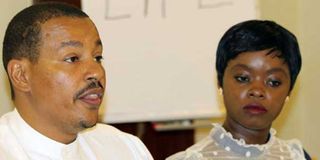We must rethink formula for solving the development challenges in Africa

Society for International Development (SID) Associate Director Mr Irungu Houghton during a press conference at Panafric Hotel, Nairobi, on October 10, 2015. SID organised a panel in partnership with the Institute for Development Studies at the University of Nairobi, which facilitated the discussion on constant engagement between scholarship and activism. PHOTO | WILLIAM OERI | NATION MEDIA GROUP
What you need to know:
- At a panel organised in partnership with the Society for International Development, the constant engagement between scholarship and activism was discussed.
- The meeting discussed the importance of data in safeguarding academic integrity and asserting policy relevance.
This week, the Institute for Development Studies at the University of Nairobi celebrated its Golden Jubilee.
Founded in 1965 and located in a wooden building overlooking Globe Cinema roundabout, the Institute has grown to make its mark not only on the academic and policy landscape in Kenya, where its primary audience is located, but also in Africa, where its key networks are strong.
Why does this matter? It matters because there is now a generalised tendency to dismiss the academia for being aloof, for not conversing with the general citizenry, for assuming a superior status and preferring esoteric language in discussing issues that ought to be relevant to everyday workings of society.
As such, it is concluded that the university is irrelevant to the concerns of the wider public.
The conference around which the IDS@50 celebration was organised demonstrated that most of these assumptions are inaccurate.
At a panel organised in partnership with the Society for International Development, the constant engagement between scholarship and activism was discussed.
The examples cited to demonstrate the continuing engagement of scholarship with activism were enough to convince one that scholarship continues to be an integral part of popular action, even if indirectly.
It was shown that the empirical base of academic conclusions matter.
The meeting discussed the importance of data in safeguarding academic integrity and asserting policy relevance.
It also discussed how academic conclusions are communicated.
DEVELOPMENT TENETS
Here, a fair criticism was made of the nature of academic work and its esotericism; the fact that academics don’t seem keen to work using a popular language.
They have relied on civil society institutions to translate the language, thereby suggesting a false dichotomy between academia and activism.
But what obscures the continuing collaborations between universities and civil society in the area of development practice?
The meeting was lucky to have Prof Adebayo Olukoshi as keynote speaker.
An academic and practitioner in development thinking, Prof Olukoshi examined the itinerary of the idea of development and how it has been studied from the post-War era to date.
Analysing the various traditions and their key assumptions about development and what development means, Prof Olukoshi noted the influence of the Marshall Plan with its focus on mass public investment versus the Morgenthau plan that intended to keep German agrarian base and prevent it from industrialising.
These two traditions, he argued, shaped development thinking for long until the intervention of Dudley Seers and his team at Sussex.
But development studies, Prof Olukoshi argued, carried an original sin through its various iterations.
This is the sin of dividing the world into two with one side of the world having all the development problems and the other side having all the development answers.
Thus, development discourse has tended to carry a set of assumptions about the global South that hardly contribute to finding the way out of the morass of development challenges.
First, there is the assumption of a universal solution to the diversity of development challenges.
Second, there is the suggestion that development solutions are quick-fix things.
Prof Olukoshi reminded us that there is no universal solution to development challenges.
One must understand the diverse contexts within which development happens.
Furthermore, he argued that development is constantly an experiment; there are no pre-determined solutions, quick-fix solutions to challenges.
One must constantly engage a trial and error process.
Though the IDS@50 celebration ended this week, the need to rethink development so that it speaks directly to the majority of people has only just began.





